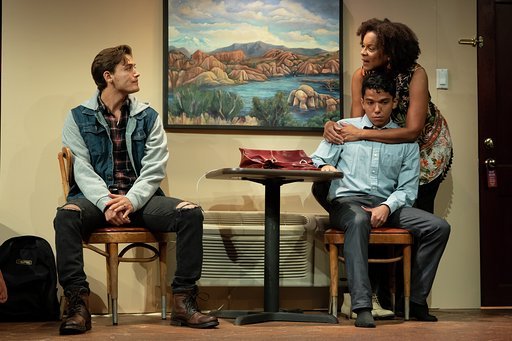Theater Review: “Curve of Departure” — A Wonderfully Provocative Comedy
By Helen Epstein
Playwright Rachel Bonds has written an often-hilarious script which nonetheless deals with such serious and widespread issues as spousal and child abandonment, drug addiction, the right to death with dignity, and same-sex adoption of children.
Curve of Departure by Rachel Bonds. Directed by Keira Naughton.Staged by the Chester Theatre Company in Chester Town Hall, 15 Middlefield Road, Chester MA, through August 18.

Left to Right: José Espinosa, Paul Pontrelli, and Ami Brabson in the Chester Theatre Company production of “Curve of Departure.” Photo: Andrew Greto.
Each time I walk into the Town Hall that is home to the Chester Theatre Company — now ending its excellent and thought-provoking 30th season — I particularly look forward to the set: the first glimpse of the world in which the play will take place. While well-endowed Williamstown tends to throw money at over-the-top sets in its state-of-the-art facility, the infinitely more modest CTC challenges its designers’ ingenuity and encourages economy of means.
Juiliana von Haubrich’s set for Curve of Departure does not disappoint. A warmly-lit airport motel room in New Mexico fills the stage, with two queen-size beds and one roll-away cot; brown, clay and orange bedspreads with turquoise highlights; plain lamps and a standard southwestern landscape painting on the wall. The play opens on an unusual situation:
Linda, an energetic, middle-aged African-American teacher is pressing pants at an ironing board. An elderly Jewish man — her ex-father-in-law Rudy, it turns out — is watching the motel TV from one of the beds. They have flown in for the funeral of Rudy’s son Lucas, the husband who abandoned Linda and their then 12-year-old son years before. Lucas’ second wife has invited them to attend the service, burial, and reception.
Linda and Rudy are two of Curve’s quartet of intriguing characters, a “strange ragtag group of humans” who make up the family in this jewel of a family play. The others who will spend the night in this motel room are Felix, Rudy’s mixed-race grandson, and Linda’s son, an ambitious young professional, and his boyfriend Jackson, a laid-back, working-class, and tattooed white Californian. They arrive late, having flown in from L.A.
In addition to creating this wonderfully awkward situation of four adults in a bedroom, which generates a range of dramatic possibilities and unusual relationships, playwright Rachel Bonds has written an often-hilarious script which nonetheless deals with such serious and widespread issues as spousal and child abandonment, drug addiction, the right to death with dignity, and same-sex adoption of children.
Director Keira Naughton has wisely chosen an understated approach to casting and staging Curve, letting characters who could easily veer into shtick avoid stereotypical gestures and remain recognizable and real. Rudy, as played by Guthrie and ACT veteran Raye Birk, offers a subtle and sympathetic portrayal of a working-class Jew who grew up on the Lower East Side of New York and has lived to see his estranged son buried in New Mexico. Birk is a repertory actor as sensitive and responsive as a chamber music player. He gives his lines their proper due, eschewing opportunities to ham them up, as when he says wryly, “No need to be sorry — I’m just losing my mind…also, I have persistent diarrhea.”
Ami Brabson as the compassionate and endlessly patient schoolteacher Linda makes Rudy’s ease with, and fondness, for his daughter-in-law totally understandable. Brabson deftly conveys both the enduring pain of having been abandoned by her husband and enduring love she has for her son and father-in-law.
As Felix, Paul Pontrelli portrays a character I haven’t seen on the stage before: a young, entitled, not altogether sympathetic gay man, focused on his career and impatient with his mother, grandfather, and lover. Jose Espinosa brings a sweetness and constancy to his role as Felix’s devoted and forthright boyfriend (and bag-carrier) Jackson, whose father also abandoned him but who is determined not to allow his baby niece to experience what he did.
The costumes by Stella Schwartz are just right as is the lighting by Matthew Adelso and the sound design by David Wiggall.
Curve of Departure packs a lot to think about into a taut, entertaining, as well as thought-provoking 90 minutes. In it, a young straight, white woman playwright has written characters who are multi-racial, and hetero as well as homosexual, drawing on several cultures, risking charges of appropriation and succeeding in blending them into a convincing and refreshing work of art.
Helen Epstein is the author of Joe Papp: An American Life and Children of the Holocaust. She has been reviewing theater for the Arts Fuse since 2010.
Tagged: Chester Theatre Company, Culture Vulture, Curve of Departure, Helen Epstein, Keira Naughton
